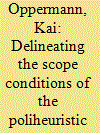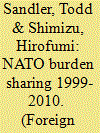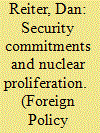|
|
|
Sort Order |
|
|
|
Items / Page
|
|
|
|
|
|
|
| Srl | Item |
| 1 |
ID:
131054


|
|
|
|
|
| Publication |
2014.
|
| Summary/Abstract |
The poliheuristic theory of foreign policy decision making would benefit from being clearer in spelling out the conditions under which it holds more or less analytic promise. The article makes the case that the concept of issue salience can help the theory address its shortcomings in this respect. In particular, the explanatory power of poliheuristic theory's two-stage model largely depends on the noncompensatory principle of major domestic political loss avoidance on the first stage of the model to simplify the choice set to be considered on the second stage. This is more likely to happen, however, in the case of issues that are highly salient to a government's selectorate than in the case of issues that are of low salience in the domestic arena. The poliheuristic theory should thus be more powerful if it is applied to domestic high-salience rather than low-salience decisions. These theoretical contentions are illustrated in a case study on the decision making of the British Labour government under Tony Blair in the fields of European security and defense policy and the single European currency.
|
|
|
|
|
|
|
|
|
|
|
|
|
|
|
|
| 2 |
ID:
131057


|
|
|
|
|
| Publication |
2014.
|
| Summary/Abstract |
The paper investigates how states manage multiple rivalries when faced with immediate threats. We argue that accommodation of one rival allows states to shift resources from the management of another rival to deal with the costs of immediate threats. By examining enduring rivalries from 1966 to 1999, we show that states' reliance on accommodation in response to threats varies depending on the number of severe threats and the relative capabilities between the states and the threat-issuing rivals. Findings show that when faced with severe but few threats, states prefer to accommodate rivals that did not issue the threat. They are also more likely to give larger concessions to such rivals and to those issuing less severe threats. Finally, the greater the military capability of a rival issuing a severe threat relative to that of the challenged state, the more likely that a threatening rival is accommodated.
|
|
|
|
|
|
|
|
|
|
|
|
|
|
|
|
| 3 |
ID:
131055


|
|
|
|
|
| Publication |
2014.
|
| Summary/Abstract |
Motivated by US Secretary of Defense Robert Gates' farewell address to NATO, this article investigates whether NATO burden-sharing behavior has changed during the last ten years. Based on a Spearman rank correlation test, we find almost no evidence that the rich NATO allies shouldered the defense-spending burden of the poor allies during 1999-2009. In 2010, there is the first evidence of the exploitation of the rich. When allies' defense burdens are related to defense benefit proxies, a Wilcoxon test finds that there is no concordance between burdens and benefits after 2002. This is indicative of a less cohesive alliance, in which allies are not underwriting their derived benefits. We also find that allies' benefits, which are tied to their exposed border protection and terrorism risk, motivate defense spending. Allies' benefits, based on economic base and population, are less of a driver of defense spending for most NATO allies. We devise a broad-based security expenditure burden that accounts for defense spending, UN peacekeeping, and overseas foreign assistance. In terms of this security burden, there is evidence of the exploitation of the rich by the poor beginning in 2004. Our findings indicate a two-tiered alliance that faces significant policy challenges.
|
|
|
|
|
|
|
|
|
|
|
|
|
|
|
|
| 4 |
ID:
131053


|
|
|
|
|
| Publication |
2014.
|
| Summary/Abstract |
Few systematic studies of US uses of force treat the inherent attributes of presidents as the key causal factors; nonetheless, the fact that individual leaders matter is evident to the public, the media, and foreign policymakers in other countries. This study advances the development of First Image explanations of conflict by empirically investigating the relationship between presidential personality and the variation surrounding foreign policy decision making. The importance of this type of variance has been understudied in international relations, and the consistency of leaders' policy decisions has important strategic implications for interstate conflict. Relying on Big Five measures of US presidents' personality traits, we find that leaders who have a high tendency toward Excitement Seeking are more likely to use force to carry out their foreign policy objectives, while those who are more Open to Action exhibit a greater variance around their foreign policy decision making. In sum, the personality traits of individual leaders influence not only the choices they make, but the consistency of their choices, which has important consequences for US foreign policy.
|
|
|
|
|
|
|
|
|
|
|
|
|
|
|
|
| 5 |
ID:
131056


|
|
|
|
|
| Publication |
2014.
|
| Summary/Abstract |
This article develops a theory connecting security commitments and the decision to acquire nuclear weapons. In a threatening environment, third party security commitments can reduce a state's fear of abandonment in the event of war and its motive for acquiring nuclear weapons. However, a threatened state may reject at least some kinds of security commitments, such as foreign deployed nuclear weapons, if it fears that such commitments increase the risks of entrapment, the possibility that the threatened state will be dragged into a war it would like to avoid. The article looks at three kinds of security commitments, alliances, foreign deployed nuclear weapons, and foreign deployed troops. In quantitative tests, it finds strong evidence that foreign deployed nuclear weapons reduce proliferation motives, only very limited evidence that alliances reduce proliferation motives, and no evidence that foreign deployed troops reduce proliferation motives. It also presents several qualitative evidence, which supports the quantitative evidence, and in particular helps explain why alliance ties sometimes do not prevent proliferation.
|
|
|
|
|
|
|
|
|
|
|
|
|
|
|
|
|
|
|
|
|